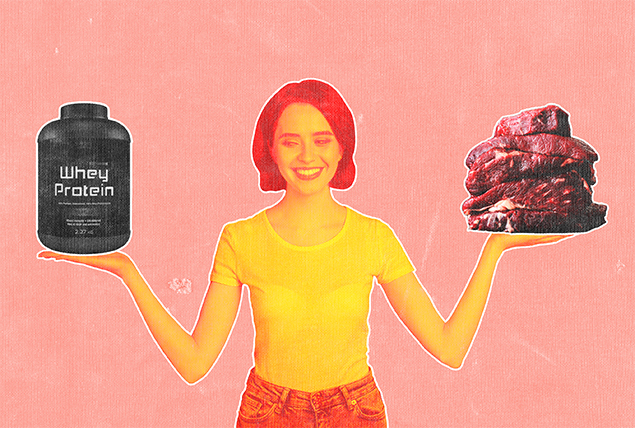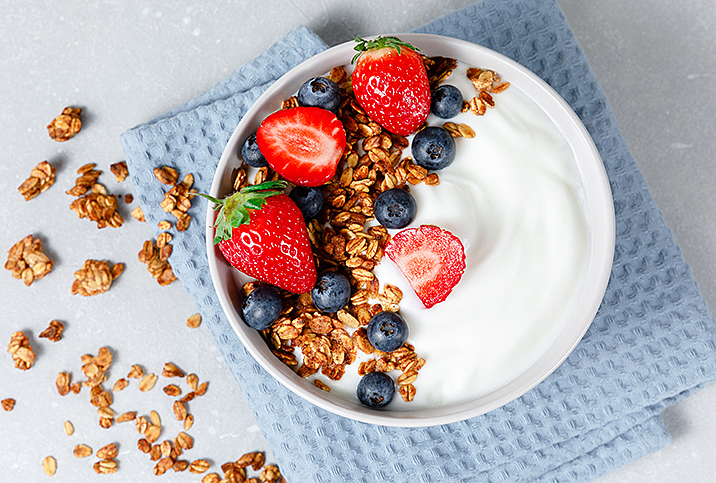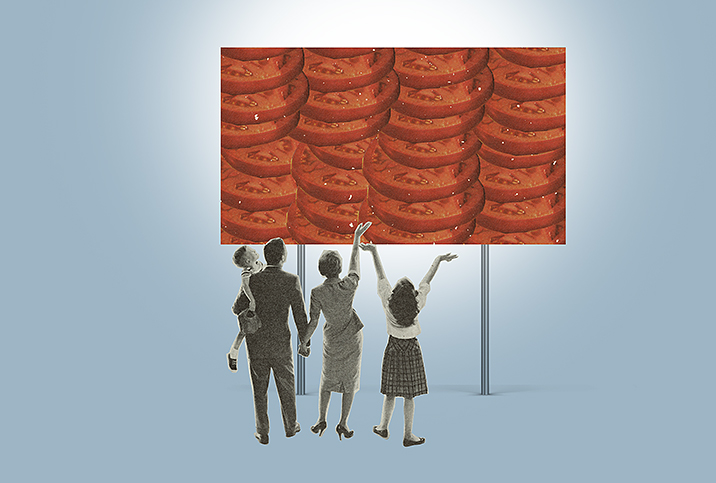How Much Protein Do Women Really Need?

Protein has a great publicist. It's in overpriced powders, which are often the secret ingredient in influencers' favorite recipes. It seems to be an essential part of every other weight loss diet, from Atkins to keto. Most people appear to be hyper-focused on protein—and wonder if they're getting enough of it.
But how much protein does a woman need? Is there such a thing as too much protein?
How much protein do women really need?
"Protein is the Greek word that literally means 'of prime importance.' It’s the foundation to every human body, required by every cell in the body and is an important building block for the structures in our body, including muscles, bones, blood and cartilage," said Alisia Essig, a plant-based nutritionist and the founder of PlantWhys in Washington, D.C.
The recommended amount of protein for women depends on age, weight and physical activity. Generally, adult women require 46 grams of protein a day, explained Dung Trinh, M.D., the chief medical officer and co-founder of the Healthy Brain Clinic in Los Angeles.
Women typically need less protein than men, as men, on average, have more muscle mass and a higher overall body weight compared to women. Adult men need about 56 grams per day, Trinh added.
Measuring the amount of protein you need
If getting the right amount of protein can vary on different factors, how do you know how much you need? You have a few options.
"To measure the amount of protein your body needs, you can use online protein calculators, consult with a registered dietitian or have your protein needs assessed through a metabolic test, according to Trinh.
In addition to protein calculators and consulting with a healthcare professional, there is another way to figure out how much protein you need.
"Generally speaking, anywhere from 10 to 35 percent of your calories should be coming from food that contains protein. To calculate your protein needs, you can take a look at your calories or your weight. To use the weight method, convert your weight to kilograms (divide your weight in pounds by 2.2) and multiply it by 0.8. For the average, sedentary adult, 0.8 to 1.0 grams of protein per kilogram of body weight per day is ideal," said Sara Riehm, R.D., L.D.N., a registered dietitian who specializes in obesity and weight management at Orlando Health in Florida.
Since everyone's protein needs are different, anyone who's concerned should consult a healthcare professional for personalized recommendations, Trinh advised.
Protein needs change with age
The protein your body requires as a teen isn't the same as when you are in your 30s or 50s. Your muscle mass changes and that affects daily protein requirements.
Women and men tend to start losing muscle mass—a process called sarcopenia—around age 30. Consuming more protein and specific exercises can make up for this muscle loss, according to Florence Comite, M.D., an endocrinologist and the founder of the Comite Center for Precision Medicine & Health in New York City.
Resistance exercises with weights or one's own body weight can help build protein and sustain muscle, which is essential to avoiding sarcopenia and excess visceral fat.
"Muscle is your best weapon against aging and chronic disease," Comite said.
You don’t have to kiss your muscle definition goodbye, but you may need to work a little harder to maintain it.
What else can affect the protein your body requires?
In addition to age, other factors may require you to consume more or less protein, such as body weight and composition. Heavier people and individuals with more muscle mass might need more protein.
If you engage in regular and intense physical activity, you might need more protein than someone who is less active. If you are pregnant and lactating, you might need more protein to support the growth of your fetus.
However, if you have health conditions such as liver and or kidney disease, you might have to modify your protein intake, according to Trinh.
What happens if you don’t get enough protein?
Some signs of insufficient protein intake, according to Comite, might include the following:
- Feeling unusually weak or tired
- Brittle or damaged nails and hair
- Moodiness
- Feeling hungry more often
- Getting sick more frequently
- Staying ill longer than expected
Not consuming enough protein and calories can lead to malnutrition. In severe cases, this can lead to the absence of menstruation (amenorrhea), Riehm suggested.
"Protein deficiency is rare in the United States. Amenorrhea usually happens in extreme cases with very low calories, restrictive diets or in women struggling with eating disorders," Riehm said. "Consuming adequate protein helps our bodies function optimally. The best way to make sure we’re getting enough protein in our diets is intentionally including a variety of sources at all meals."
How can vegans and vegetarians get enough protein?
Vegans and vegetarians may hear concerns about whether or not it’s possible to get enough protein. Is this a valid concern?
"Vegans and vegetarians can consume enough protein if they follow a balanced diet that includes a variety of protein-rich plant-based foods," Trinh said. "Some plant-based sources of protein include legumes (beans, lentils, peas), whole grains, nuts and seeds and soy products."
It is important for vegans and vegetarians to pay attention to their protein intake, especially if their diet isn't varied or if they need more protein due to factors such as pregnancy or their physical activity level, Trinh added.
Protein for working out
Is it true that people need an increase in protein after a workout? Do women need more protein after exercising?
"The amount of additional protein you should consume if you are working out depends on the intensity and frequency of your exercise, and your overall diet. Women who are regularly exercising may require an additional 10 to 20 grams of protein per day to support muscle growth and repair," Trinh said.
"If a woman is a competitive athlete or participating in a strenuous strength training program, she may need the high end of the range or even as much as 2.0 g/kg of body weight," Comite added.
Protein during your cycle
You may have heard you need more protein when you're menstruating because of the blood lost during your cycle.
Women need sufficient protein when menstruating to keep a steady supply of iron, which all protein-rich foods contain. Protein is key to transporting iron in the body, and a lack of iron can lead to health issues, especially anemia, said Catherine Gervacio, R.N.D., a nutrition writer for Living Fit based in the Philippines.
Iron is key during menstruation
"Every time a woman menstruates, approximately 1 mg of iron is lost. That's why it is very important to keep a steady supply of iron to not suffer [the] consequences of deficient levels. Low iron symptoms include tiredness and fatigue, pale skin, headache, irregular heartbeat and even brittle nails," Gervacio said.
Women ages 19 to 50 need 14.8 mg of iron per day, according to Gervacio, which can come from a wide range of foods such as:
- Lean beef
- Chicken
- Fish
- Seafood
- Organ meats
- Green leafy vegetables such as kale, spinach or Swiss chard
- Beans
- Peas
- Iron-fortified foods such as cereals, bread or pasta
Don't forget about fiber during your cycle
"When menstruating, what is more important than protein is eating enough fiber. Fiber helps to pull out excess hormones. When a diet is high in animal and processed foods, it generally lacks enough fiber," Essig said. "These extra estrogens, which should bind to fiber in the digestive tract and leave the body, get absorbed back into the bloodstream when the diet is too high in animal protein and lacking enough fiber."
The Dietary Reference Intake recommends 25 grams of fiber per day for women.
When a woman's diet is too high in animal protein and lacks fiber, hormone "recycling" occurs, which boosts estrogen in the blood. Fiber can block the reabsorption of estrogen and reduce estrogen levels, which can help reduce menstrual cramps, Essig added.
"Not only do animal products lack fiber, but they also can contribute to worse menstrual pain. When looking to eat enough protein during menstruation, choosing plant-based protein is ideal. Plant-based protein sources, such as beans, are not only sufficient in protein but also contain fiber," Essig said.
Can you consume too much protein?
It is possible to consume too much protein, which can lead to weight gain and other health issues.
"After the body’s protein needs are met, any extra protein in a woman's system is either used for energy or stored as fat," Comite said.
Other health risks from consuming too much protein depend on the type of protein. If your main source of protein is red and or processed meats, these can be high in saturated fat, which can increase your cholesterol and lead to heart disease, according to Riehm.
Other risks of too much protein
In addition to weight gain and heart disease, another side effect of consuming too much protein is kidney damage. Too much protein can strain the kidneys, especially if you have a pre-existing kidney condition. Dehydration can occur, as consuming large quantities of protein can cause increased urine production, which can lead to dehydration, Trinh stressed.
Consuming large amounts of protein can cause calcium loss, as more calcium is excreted in the urine when you're consuming a lot of protein, which can cause osteoporosis. A diet rich in high-fat animal protein can put a strain on your liver, Trinh said. But these side effects won’t occur overnight.
"It's important to keep in mind that these health problems can occur with long-term, excessive protein intake and are typically not a concern with moderate protein consumption as part of a balanced diet," Trinh said.
The bottom line
Women have protein guidelines to follow. These suggestions fluctuate over time and change based on physical activity intensity, menstruation and age. Consult your doctor before making changes to your diet.
Do you need a new doctor? Giddy Telehealth provides a convenient way to find a new healthcare professional. Use the online portal to search through hundreds of doctors. Many offer same-day appointments or video consultations.


















